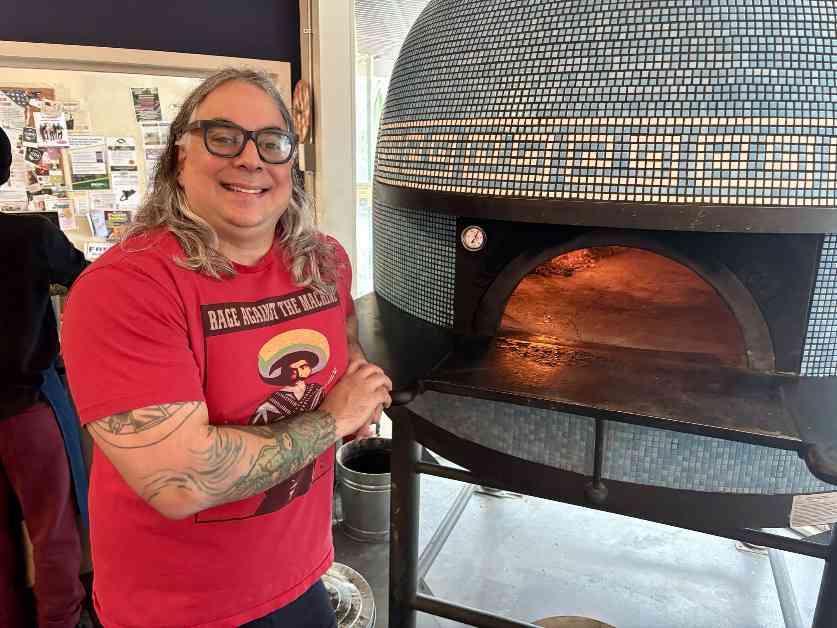Many local restaurant owners are still ordering from back stock and are holding their breath to see what the full effects of Trump administration tariffs will be once the supply of foreign goods in the U.S. runs out. As restaurants juggle the increased cost of living, paying staff, and flood recovery, the uncertainty of tariffs has become yet another worry. And for some restaurants, the absence of Canadian regulars is already noticeable.
Restaurants are “community gathering spaces that inject economy into the economy,” said Chris Ruiz, a co-owner of Pearl Street Pizza in Barre. And like so many other Americans, those in the restaurant business are waiting to see how the Trump administration’s policies will affect their businesses and lives.
Pearl Street Pizza used to have Canadian customers every single week, Ruiz said. “We have had zero Canadian tourism,” since implementation of the tariffs. Canadians would come year-round, he said, not just during peak tourist seasons; and they were frequent visitors at Pearl Street. The message coming out of Canada, Ruiz said, is “‘Hey, the Americans started this stupid tariff war, don’t go there.’ And they’re listening to that message.”
According to Ruiz, Pearl Street has yet to see price increases because of tariffs. Distributors are still working through old stock, he said, or they are getting stock from ships in transit with “the agreed upon old pricing.”
Diane Hook of The Meltdown restaurant in Barre also has not seen prices go up. Hook, born in Montreal, said she likes to keep the Canadian connection alive and she serves Canadian beer and smoked meat from Montreal. Her Montreal smoked meat sandwich is the most popular dish on her menu, she said. Her supplier, Reinhart Foodservice, has 300 cases of Canadian smoked meat left, but once that runs out Hook doesn’t know what to expect.
Diane Hook, owner of The Meltdown in Barre, is worried about how Trump tariffs will affect her business. Photo by Cassandra Hemenway.
Since November 2024, Hook said, sales at The Meltdown have been down 36%. It’s hard to tell what’s going on, she said, “with tariffs, [with] people being scared, I’m scared.” She’s not sure how she will navigate the future. She said The Meltdown used to offer punch cards for a free sandwich, but at this point, “I can’t afford to give anything away.”
Hook also said she will have to let some of her employees go. Still, she is hoping that Cinco de Mayo and Mother’s Day will bring in more revenue and that more Americans will start to travel within the United States.
Neda Bikic of A Taste of Europe on Elm Street in Montpelier said she did not see a change in price when she ordered in March. She said she will compare prices when she orders again in mid-May. If wholesale prices go up, she said, she will adjust her prices as well.
Another business owner, Lauren Parker of the North Branch Café in Montpelier (“a cozy tea café,” according to its website), wrote in an email to The Bridge that she also has noticed an absence of Canadian customers. Two thirds of the tea that fills ceiling-high shelves at the café comes from China, Parker said. Thus far she has been able to order from existing inventory, but distributors have already posted higher prices. She said she has to “look closely before ordering.”
“Everything feels like a moving target,” Parker wrote. In addition to higher prices and having to advance-order more tea product than usual, she is also concerned about the price of propane and electricity. The landlord, Parker said, has stopped propane deliveries from Irving, a Canadian-owned company. Summer heat and the cost of running the air conditioner has her worried about electricity price increases because electricity is sourced from hydroelectric facilities in Canada.
Lauren Parker, owner of the North Branch Cafe in Montpelier, expects high tariffs to affect one of the signature products she sells: tea from China. Photo by John Lazenby.
Devon Collins of Three Penny Taproom in Montpelier said they haven’t been affected by price changes yet. An estimated 10% to 15% of their beer is foreign, Collins said, and they don’t know if they will “eat the cost, raise the price for customers, or just pivot and focus more on local beers.” He also noted that Scotch whiskey, Jamaican rum, and Polish vodka already have a high price point.
The Montpelier location of The Skinny Pancake, according to Bill Greene, the regional manager, has actually seen more business because of increased activity at the Statehouse and more people walking around downtown. The Skinny Pancake used to close at 3 p.m. on Saturdays, Greene said, but now stays open until 7 p.m.
Ruiz, of Pearl Street Pizza, said foot traffic and sales have been down in the last couple months, “nothing too dramatic but enough to be concerned with.” He aims to stay positive, keep prices the same, and be creative. Pearl Street, said Ruiz, incorporates many ingredients from Vermont Salumi in Barre and 5th Quarter Butcher Shop in Waitsfield. Much of what Pearl Street orders is from local producers, Ruiz noted, adding that he hopes to strengthen those ties.
Aside from food and beverages from other countries, take-out supplies may also see a price increase. Pearl Street Pizza’s plastic utensils come from China and some of their take-out lids come from Mexico. Parker of North Branch Café said her take-out containers do not come from the United States. It’s difficult to tell where the exact country of origin is, she said, but it seems many boxes, cans, jars, and packaging products come from China.
The uncertainty of tariffs is taking a psychological toll on restaurant owners and managers. Collins of Three Penny described the tariffs as “looming,” and Greene of The Skinny Pancake described the effect of tariff policies as “pulling the rug back and forth.”
“The greatest concern right now is the unknown possibilities,” said Parker.


















